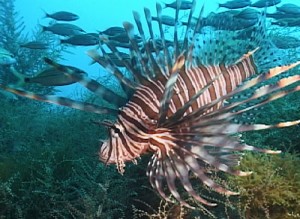NSU Newsroom
SharkBytes
Horizons
This version of NSU News has been archived as of February 28, 2019. To search through archived articles, visit nova.edu/search. To access the new version of NSU News, visit news.nova.edu.
This version of SharkBytes has been archived as of February 28, 2019. To search through archived articles, visit nova.edu/search. To access the new version of SharkBytes, visit sharkbytes.nova.edu.
Nova Southeastern University Researcher Invents Software to Predict Lionfish Invasion
Software shows where invaders are spreading from their point of origin
FT. LAUDERDALE-DAVIE Fla. — A Nova Southeastern University (Nova) researcher has invented software that helps predict invasion patterns of non-native species including the lionfish, a predatory species that has invaded Florida’s coastal waters as well as the Loxahatchee River.
Matthew Johnston, M.S., a researcher at Nova’s Oceanographic Center and its National Coral Reef Institute, is the creator of InvasionSoft, a computer program that helps scientists track lionfish and other invasive species by providing models and maps of where authorities should focus their efforts to combat the invasion.
Based on historical data, the computerized maps show the likely origin of the lionfish invasion and potential areas where it has spread. The software helps focus efforts to combat the nuisance fish.
“It is very accurate on a large scale and will be a useful tool to help mitigate invasions by non-native species, such as the lionfish,” said Johnston, adding that he is producing a version of the software for the Internet for the public to use freely.
Native to Northern Australia, Indian Ocean, and Indonesia, the lionfish have found their way over the years to South Florida. That’s because pet owners released them into the wild from aquariums. Their populations have mushroomed in South Florida’s tropical waters.
In the Loxahatchee River, which flows from Martin and Palm Beach counties into the Atlantic Ocean, lionfish have been spotted in shallow water near mangrove trees. The lionfish is a ravenous predator and has been devouring juvenile fish. This in turn, disrupts the food chain and the ecosystem because those juvenile fish would have eventually populated coral reef ecosystems as they aged.
“I think we can control the lionfish population,” Johnston said. “But I don’t see how it’s possible to get rid of them. Hopefully, there will be more natural predators preying on them and smaller fish eventually learn that the lionfish is a threat.”
Johnston said his software invention will be very helpful for scientists and environmental officials at the frontlines of the invasive species fight. Fisherman, he said, can also help by catching more lionfish. They are good eating fish for any dinner table.
To see InvasionSoft’s lionfish tracking data, please click on this link: http://www.kramer.mattspace.com/index.php/lionfish/lionfishanimations
About the Oceanographic Center: A world leader in marine biological research with focus on coral reef science and shark conservation, Nova Southeastern University’s Oceanographic Center has been at the forefront of graduate and undergraduate marine science education and oceanographic research for over 48 years. Students, scientists, faculty and staff come to the Center from all corners of the globe, with the common goal of learning from the ocean’s living classrooms — in one of the most diverse ecosystems known to man.
About Nova Southeastern University: Located in Davie, Florida, Nova Southeastern University (NSU) is a dynamic fully accredited Florida University dedicated to providing high-quality educational programs of distinction from preschool through the professional and doctoral levels. NSU has more than 29,000 students and is the seventh largest not-for-profit independent institution nationally. The University awards associate’s, bachelor’s degrees, master’s degrees, specialist, and first-professional degrees in a wide range of fields, including business, counseling, computer and information sciences, education, medicine, optometry, pharmacy, dentistry, various health professions, law, marine sciences, early childhood, psychology and other social sciences. Classified as a research university with “high research activity” by the Carnegie Foundation for the Advancement of Teaching, NSU was also awarded Carnegie’s Community Engagement Classification in 2010 for the University’s significant commitment to and demonstration of community engagement. For more information about NSU visit www.nova.edu.
Media Contact:
Ken Ma, NSU Office of Public Affairs
954-262-5408 (office), 954-830-4177 (cell), ken.ma@nova.edu
